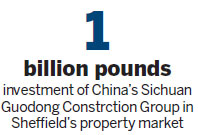Developers still keen on UK projects
Updated: 2016-08-12 07:57
By Cecily Liu(China Daily Europe)
|
|||||||||
Chinese companies say their experience and resources work in their favor in the post-Brexit environment
Chinese property developers are still upbeat on the British market despite the uncertain effect of Brexit on the economy, finding that their access to funding and their cost-cutting experience are key advantages. This is especially so as China's domestic property boom is slowing.
Sichuan Guodong Construction Group announced in July its commitment to invest 1 billion pounds ($1.3 billion; 1.2 billion euros) in Sheffield's property market over the next 60 years. It is the largest Chinese investment in the UK outside London.
|
An artist's sketch of One Nine Elms, a new development in London being built by Dalian Wanda. Provided to China Daily |
Other notable investments include Dalian Wanda's 900 million pound development of the London residential block One Nine Elms, and ABP's 1.7 billion pound development of a business complex next to London's City Airport.
Such investments generally bring in handsome profits. Dominic Grace, director of Savills' London residential development team, estimates Chinese developers could derive an internal rate of return of about 15 to 20 percent, calculated as profits on costs.
Industry analysts say Chinese developers' UK expansion is set to continue, as the UK's residential and commercial property markets grow along with the country's population, and the weak sterling provides good bargains for Chinese developers to invest post-Brexit.
"Brexit notwithstanding, the UK is historically, economically, politically, legally and socially stable and safe. Of immediate relevance, the weakening of sterling obviously confers a foreign exchange advantage," says John Burns, a real estate partner at the law firm Gowling WLG.
The UK's housing market has demonstrated relative stability post Brexit, as the Halifax house price index demonstrated an 8.4 percent year-on-year growth in July, despite a drop of 1 percent compared with June.
Lu Junwei, a senior associate at law firm Berwin Leighton Paisner, says English-speaking countries like the US, the UK and Australia are top choices for Chinese developers. Investments in mainland Europe are beginning, but show a lesser trend.
One key advantage for Chinese developers is their access to financing, especially from Chinese banks familiar with their track record. Dalian Wanda's development is financed by Ping An bank and ABP's by CITIC Bank.
"While Chinese property developers' ability to secure financing for the large-scale projects is hard to ignore, their management expertise and their reputation of being able to deliver under tight deadlines are the very reasons for their ability to secure such financing," Lu says.

Beijing Construction Engineering Group is investing in the 800 million pound Manchester Airport City project, a new urban quarter consisting mainly of commercial buildings next to Manchester Airport. Furthermore BCEG is investing in two mixed commercial-residential developments, known as Middlewood Locks and St. Michael's, in Manchester.
Yu Dongwen, BCEG's UK operations director, says BCEG operates with an uncommon model in the UK, being both the investor and contractor for projects, whereas in China and most other emerging markets the company would typically only be the contractor.
"By being involved in the preconstruction stage, we are then able to join discussions about the project's overall design, and in places where the original design cannot be efficiently constructed we will give our advice on how to alter the design so that construction at a later stage can be implemented more efficiently," Yu says.
Another key advantage is their ability to reduce costs in the construction process through techniques like modular construction, says Richard Laudy, head of infrastructure at law firm Pinsent Masons.
"As modular construction techniques take manufacturing offsite into a controlled environment, meaning cost can be controlled easier, and cost reduction comes with scale, it can really make a difference to the UK construction market," Laudy says.
Modular construction techniques are used by CIMC MBS, the UK subsidiary of Shenzhen-based China International Marine Containers. Using modular techniques to build standard hotel rooms at its China factory, and then shipping them to construction sites, CIMC MBS has already helped build more than 10 UK hotels for brands like InterContinental Hotels Group, Rezidor Hotel Group, Accor and Hilton.
Michael Crane, design manager of CIMC MBS, says modular construction provides about 25 to 30 percent in cost savings over conventional construction savings.
There have been some failures. In 2013, Shanghai-based developer Zhongrong Group announced a 500 million pound project to recreate London's Crystal Palace, the Victorian building that housed the Great Exhibition of 1851, and add commercial and residential elements to the property complex.
The project received strong support from the local council of Bromley, because it would have created 2,000 jobs, but it was scrapped in 2015. Zhongrong was quoted in the Financial Times as saying it could not reach agreement with the local government on size and leasehold arrangements.
Laudy stresses the importance for Chinese developers to understand the legal framework of the UK's property market, especially regarding bidding, managing supply chains and corporate social responsibility.
"For example, in putting in bids to compete for a deal, Chinese developers need to understand the UK's planning requirements, including its standards for health and safety, impact on the environment, impact on local employment and the corporate social responsibility requirements that go with a project," Laudy says.
cecily.liu@chinadaily.com.cn
(China Daily European Weekly 08/12/2016 page29)
Today's Top News
Chinese investment in European football
Myanmar's Suu Kyi to visit Beijing
Ukraine denies attempted troop invasion of Crimea
Solidarity called to firefighters facing wildfires
Eurostar train staff to strike for seven days: UK union
Trump's gun rights comments ignite firestorm
China consumer prices up 1.8% in July
Video introduces G20 city Hangzhou to Europe
Hot Topics
Lunar probe , China growth forecasts, Emission rules get tougher, China seen through 'colored lens', International board,
Editor's Picks

|

|

|

|

|

|








